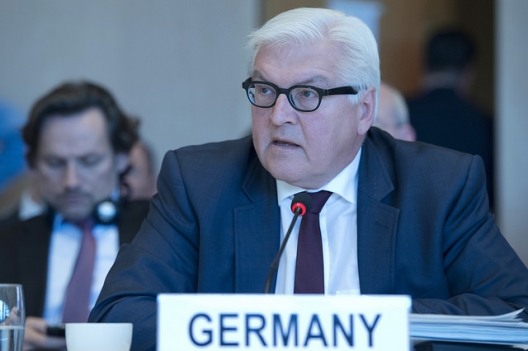 Today, the trans-Atlantic bond is being tested again. Crises are erupting ever closer to the European Union’s borders: the civil war in Syria, the upheaval in Libya, increasing refugee flows across the Mediterranean and, not least, the dangerous escalation brought about by Russia’s annexation of Crimea a year ago and the separatism in eastern Ukraine, stoked by Russian military support and supplies. The post-1989 European order is openly being called into question.
Today, the trans-Atlantic bond is being tested again. Crises are erupting ever closer to the European Union’s borders: the civil war in Syria, the upheaval in Libya, increasing refugee flows across the Mediterranean and, not least, the dangerous escalation brought about by Russia’s annexation of Crimea a year ago and the separatism in eastern Ukraine, stoked by Russian military support and supplies. The post-1989 European order is openly being called into question.
Germany and France have engaged in a determined diplomatic effort to tackle the crisis in Ukraine with the overriding objective of de-escalating the fighting and paving the way for a political resolution. This effort, based on a closely coordinated European and trans-Atlantic strategy, is founded on four pillars. First, we have taken a firm stance against Russia’s aggression through a calibrated series of measures, including sanctions. Second, we are strengthening NATO, along the lines agreed to at the Wales summit meeting in September. Third, we are supporting Ukraine’s transition through economic, humanitarian and political support. Finally, we want to engage Russia with the aim of ending the conflict and moving toward a more cooperative relationship….
Germany does not shy away from making full use of its foreign policy tools. We are still very much present in stabilizing Afghanistan. We equip and train the Kurdish pesh merga forces against the threat of the Islamic State in Iraq. German military contingents also support the political stabilization effort in Mali and are the largest presence in Kosovo. Yet now more than ever, understanding the intended and unintended effects of our diplomatic and military instruments, as well as the limits of our capabilities, is an essential part of a viable foreign policy.
This does not mean embracing moral relativism. Yet holding firm to our moral precepts must go hand in hand with a realistic assessment of constraints and with strategic patience. This is as true for the United States, which has underwritten the current international order for many decades, as it is for Germany, which has profited immensely from this order and is starting to assume a broader international responsibility commensurate with its weight, its interests and its means.
Image: German Foreign Minister Frank-Walter Steinmeier, Jan. 22, 2014 (photo: Jean-Marc Ferré/United Nations)
